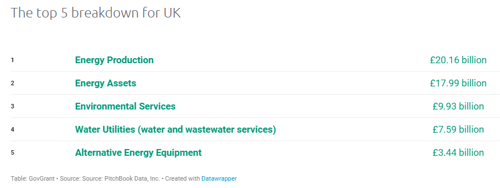Report shows UK leading way in cleantech
A new report has highlighted the UK’s prominent role in cleantech, with 18 per cent of total European spend in the sector invested here.

Created by IP and tax specialists GovGrant, the report examines cleantech investment spend this century, looking at companies focused on decarbonisation activities across renewable energy, environmental services and agricultural innovations. Global investment in cleantech reached £134bn in 2021, an increase on the previous record of £129bn in 2018.
“As climate change action becomes increasingly urgent, it’s no surprise that investment in cleantech is soaring. However, the level of growth is still remarkable,” said Adam Simmonds, investment research analyst at GovGrant.
“The strength of the sector in the UK is also really pleasing. Clearly, our cleantech sector, helped by tax credits, is flourishing. It’s going to be exciting to see where the industry goes and what rising investment can do for the future of the planet.”

Globally, the report identifies over 21,800 companies working in the sector, with 8,500 headquartered in Europe. The UK is home to just under 2,000 of these companies, around nine per cent of the worldwide total.
Register now to continue reading
Thanks for visiting The Engineer. You’ve now reached your monthly limit of news stories. Register for free to unlock unlimited access to all of our news coverage, as well as premium content including opinion, in-depth features and special reports.
Benefits of registering
-
In-depth insights and coverage of key emerging trends
-
Unrestricted access to special reports throughout the year
-
Daily technology news delivered straight to your inbox










Water Sector Talent Exodus Could Cripple The Sector
Maybe if things are essential for the running of a country and we want to pay a fair price we should be running these utilities on a not for profit...